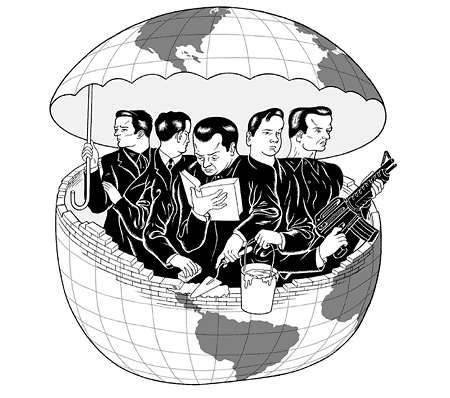The Jakarta Post, 13 April 2009
The International NGO Forum on Indonesian Development (INFID) said the World Bank might have been partly responsible for the Situ Gintung dam burst on March 27.
"Not many people realized the maintenance and management of the Situ Gintung dam was related to a World Bank project," Don K. Marut, executive director of INFID, said in a statement.
Marut blamed the deteriorating conditions of the dam in Cireundeu, Banten, partly on World Bank loan requirements the Indonesian government had to comply with under a project scheme, named Water Resources Sector Adjustment Loan (WATSAL). The US$300 million WATSAL, loan agreement was singned on May 28, 1999.
Marut said under the scheme, the Indonesian government was required to revise its laws and regulations to make them compatibel with WB standards. These requirements, among other things, resulted in authority on irrigation matters being delegated to the associations of water-users.
"Many lakes, including Situ Gintung, were neglected due to authority being delegated and lack of coordination among relevant parties," Marut said. "Given the [Situ Gintung] destuction is a result of the loan agreement under the WATSAL, we demand the World Bank admits to the Indonesian public the mistake it made in the WATSAL project."
INFID also called on the Bank to cancel and write off the loan deal.
However, Jakarta's WB senior governance adviser Douglas E. Ramage denied INFID's allegations and regarded them as "unfounded and groundless."
"The World Bank's WATSAL laon has no operational connection to Situ Gintung. The suggestion that the WATSAL loan, which closed in 2004 and the government policies and decision that it supported led to the collapse of the Situ Gintung dam are unfounded," Ramage said in a statement.
Ramage added there had not been any irrigation from the Situ Gintung dam since the early 1990s. "The irrigation function of the Situ Gintung ceased when the land was converted into a residential area. For that reason, there were no associations of water users at Situ Gintung. Therefore, any suggestion that poor maintenance has anything to do with management by water users association is also groundless."
The National Disaster Management Agency (BNPB) reported the dam burst claimed 90 lives, while four persons were still missing and 295 families were still living in temporary shelters.
Jakarta Police have been questioning some government officials who allegedly neglected the maintenance of the dam, ultimately leading to the disaster. Before the disaster, local residents reported they had found cracks in the dam walls. (JP/iwp)
Subscribe to:
Post Comments (Atom)
Rafael V. Mariano, chairperson of the Peasant Movement of the Philippines, 2000
Food has long been a political tool in US foreign policy. Twenty-five years ago USDA Secretary Earl Butz told the 1974 World Food Conference in Rome that food was a weapon, calling it 'one of the principal tools in our negotiating kit.' As far back as 1957 US Vice-President Hubert Humphrey told a US audience, "If you are looking for a way to get people to lean on you and to be dependent on you in terms of their cooperation with you, it seems to me that food dependence would be terrific."



No comments:
Post a Comment